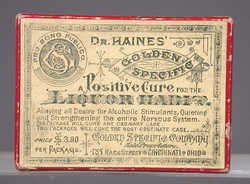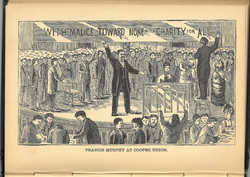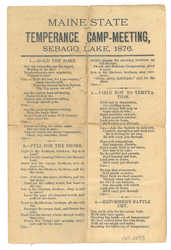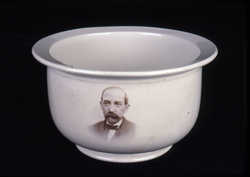Going Where it Will Do the Most Good
The Maine Democrat , Waterville, October 22, 1909
W.G. Bunker
Courtesy of Herbert C. Adams
Few images so clearly suggest the hypocrisy of 19th-century politicians pretending to serve the Prohibition cause while furthering their own aims. The GOP tended to back Prohibition more often than the Democrats who were pictured as the party of immigrants and by association, alcohol.
Voters, Attention!
Alfred, 1906
Collections of Maine Historical Society
Broadside 285
Bottle
Benjamin F. Haley, Biddeford, 1870-1880
Stoneware
Collections of the York Institute Museum, Saco
A strong supporter of the total abstinence movement, B.F. Haley bought a beer manufactory in Biddeford and began bottling non-alcoholic beverages such as root beer in 1871.

Cider as an Alcoholic Drink, WCTU pamphlet, ca. 1920
Collections of Frances Willard House Museum and WCTU ArchivesMaine Historical Society
Union Leaflets: Cider as an Alcoholic Drink
W.C.T.U., ca. 1920
Collections of Frances Willard House Museum and WCTU Archives
This is one of a number of anti-cider tracts. While Yankee farmers were quite willing to support laws to regulate drinking by immigrants and big city folks, they were against the regulation of cider, a major cash industry. In the last century cider meant the fermented beverage, not apple juice.
Dr. Haines Golden Specific Positive Cure for the Liquor Habit
Late 19th century
Courtesy of the Charles E. Burden Collection

Portland City Hall Rum Room, ca. 1930
Maine Historical Society
City Hall Rum Room
ca. 1911
Postcard
Collections of Maine Historical Society
Big But Harmless
The Maine Democrat , Waterville, 1909
W.G. Bunker
Courtesy of Herbert C. Adams
Between 1905 and 1911, Maine government made the first serious attempt to give teeth to the Dry laws. The Liquor Enforcement Commission, an arm of state government, hired deputies (known as Sturgis Men) to track down offending citizens and organizations. In Bunkers cartoon, knowing politicians muzzle the Sturgis deputies while claiming they backed Prohibition measures. Rumseller rodents run free.

Announcement for The Reformed Rumseller: Mr. Murphy, Wiscasset, 1872
Maine Historical Society
The Reformed Rumseller: Mr. Murphy
Maine, 1872
Collections of Maine Historical Society
Francis Murphy gave his first temperance lecture in Portland on April 3, 1870 and soon became a powerful voice. He was allied with Dr. Henry A. Reynolds (1839-1922), a Bangor-born graduate of Bowdoin and Harvard colleges who became an alcoholic and a founder of the Red Ribbon Reform Club.
Francis Murphy at Cooper Union
Pittsburgh, 1877
Engraving from Sketches of the Life and Work of Capt. Cyrus Sturdivant, the Prisoner's Friend (New York: William McDonald & Co., 1879).
Collections of Maine Historical Society
B St 96
A native of Ireland, Civil War veteran Murphy was pulled from jail by Capt. Studivant having told the latter, "I have been a run-seller and a run-drinker, and have brought my wife and children into trouble and ppoverty, and I do not see how Christ can forgive me." Murphy soon became a powerful voice for temperance.
Workingmen! And the Sheriff Question
Bath, 1904
Collections of Maine Historical Society
The Socialist take on the liquor question is neatly stated in this 1904 political statement. A small Socialist party garnered 700 hundred local followers prior to WWII.
Maine State Temperance Camp-Meeting
Sebago Lake, 1876
Collections of Maine Historical Society
Coll. 2093, Box 1
Sketches of the Life and Work of Capt. Cyrus Sturdivant
New York, 1882
Collections of Maine Historical Society
B St 96
A native of Ireland and Civil War veteran, Francis Murphy (1836-1907) was pulled from jail by Capt. Sturdivant. He told Sturdivant, "I have been a rum-seller and a rum-drinker, and have brought my wife and children into trouble and poverty, and I do not see how Christ can forgive me."
Chamber Pot
Portland, ca. 1900
Courtesy of the Charles E. Burden Collection
The Rev. Samuel Freeman Pearson (1841-1901) was a Portland Fundamentalist preacher, leader of the Gospel Temperance Mission, and Cumberland County Sheriff from 1900 to 1902. His photographic likeness applied to the front of this chamber pot shows that not all Portland citizens supported his enforcement of local liquor laws. The perpetrators of this lampoon remain anonymous.

Firemen in front of City Liquor Agency, Portland, 1886
Maine Historical Society
Firemen in front of City Liquor Agency
Portland, 1886
Collections of Maine Historical Society; gift of Mark Skinner, 1997
The agency sold ardent spirits for medicinal and mechanical purposes. Located at 135 Congress Street, it was a hot bed of recurring corruption, with agents often arrested by local police.

Portland City Hall Rum Room, ca. 1907
Maine Historical Society
Portland City Hall Rum Room
ca. 1900
Postcard
Collections of Maine Historical Society; gift of Madelyn Provancher, 1998
From the time Maine went dry in 1851 until the repeal of Prohibition in 1934, each town in Maine had a Rum Room where seized liquor was stored. On dump day the liquor would be poured into a sewer, river, or the ocean often with some fanfare. Not surprisingly, Rum Rooms were often the target of burglaries.










